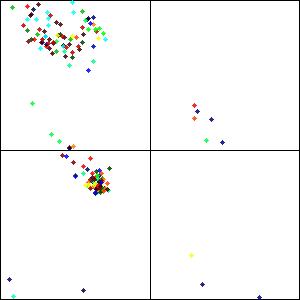Riboflavin kinase
Riboflavin kinase is an enzyme that plays a crucial role in the biochemical pathway of vitamin B2 (riboflavin) metabolism. This enzyme catalyzes the phosphorylation of riboflavin to form flavin mononucleotide (FMN), a process that is essential for the utilization of riboflavin by the cell. FMN acts as a cofactor for various oxidoreductase enzymes and is critical for numerous cellular processes, including energy metabolism, cell growth, and development.
Function[edit | edit source]
Riboflavin kinase (EC 2.7.1.26) catalyzes the ATP-dependent phosphorylation of riboflavin to produce FMN, according to the reaction:
ATP + riboflavin → ADP + FMN
This reaction is the first step in the conversion of riboflavin into its active forms, FMN and flavin adenine dinucleotide (FAD), which are essential cofactors for a wide range of enzymatic reactions. The activity of riboflavin kinase is therefore pivotal for the cellular uptake and utilization of riboflavin and for maintaining the cellular redox state.
Structure[edit | edit source]
The structure of riboflavin kinase varies among different species, but it generally consists of a single polypeptide chain that folds into a compact structure. The active site of the enzyme is designed to bind both ATP and riboflavin, facilitating the transfer of a phosphate group. In humans, riboflavin kinase is encoded by the RFK gene, which has been mapped to chromosome 9.
Clinical Significance[edit | edit source]
Alterations in the activity or expression of riboflavin kinase can lead to disturbances in riboflavin metabolism, potentially resulting in cellular dysfunction and disease. Deficiencies in riboflavin kinase activity have been associated with multiple disorders, including certain types of anemia and neurodegenerative diseases. Moreover, since riboflavin is crucial for energy production and antioxidant defense, its proper metabolism is essential for overall health.
Genetic Regulation[edit | edit source]
The expression of the RFK gene, and consequently the activity of riboflavin kinase, is regulated by various transcription factors and microRNAs that respond to the cellular levels of riboflavin and energy status. This ensures that the synthesis of FMN and FAD is matched to the cellular demand for these cofactors.
Pharmacological Aspects[edit | edit source]
Given its central role in riboflavin metabolism, riboflavin kinase has been explored as a potential target for the development of drugs aimed at modulating the cellular levels of FMN and FAD. Such drugs could have therapeutic potential in diseases where disrupted flavin metabolism plays a role.
See Also[edit | edit source]
This article is a biochemistry stub. You can help WikiMD by expanding it!
Search WikiMD
Ad.Tired of being Overweight? Try W8MD's physician weight loss program.
Semaglutide (Ozempic / Wegovy and Tirzepatide (Mounjaro / Zepbound) available.
Advertise on WikiMD
|
WikiMD's Wellness Encyclopedia |
| Let Food Be Thy Medicine Medicine Thy Food - Hippocrates |
Translate this page: - East Asian
中文,
日本,
한국어,
South Asian
हिन्दी,
தமிழ்,
తెలుగు,
Urdu,
ಕನ್ನಡ,
Southeast Asian
Indonesian,
Vietnamese,
Thai,
မြန်မာဘာသာ,
বাংলা
European
español,
Deutsch,
français,
Greek,
português do Brasil,
polski,
română,
русский,
Nederlands,
norsk,
svenska,
suomi,
Italian
Middle Eastern & African
عربى,
Turkish,
Persian,
Hebrew,
Afrikaans,
isiZulu,
Kiswahili,
Other
Bulgarian,
Hungarian,
Czech,
Swedish,
മലയാളം,
मराठी,
ਪੰਜਾਬੀ,
ગુજરાતી,
Portuguese,
Ukrainian
Medical Disclaimer: WikiMD is not a substitute for professional medical advice. The information on WikiMD is provided as an information resource only, may be incorrect, outdated or misleading, and is not to be used or relied on for any diagnostic or treatment purposes. Please consult your health care provider before making any healthcare decisions or for guidance about a specific medical condition. WikiMD expressly disclaims responsibility, and shall have no liability, for any damages, loss, injury, or liability whatsoever suffered as a result of your reliance on the information contained in this site. By visiting this site you agree to the foregoing terms and conditions, which may from time to time be changed or supplemented by WikiMD. If you do not agree to the foregoing terms and conditions, you should not enter or use this site. See full disclaimer.
Credits:Most images are courtesy of Wikimedia commons, and templates, categories Wikipedia, licensed under CC BY SA or similar.
Contributors: Prab R. Tumpati, MD




